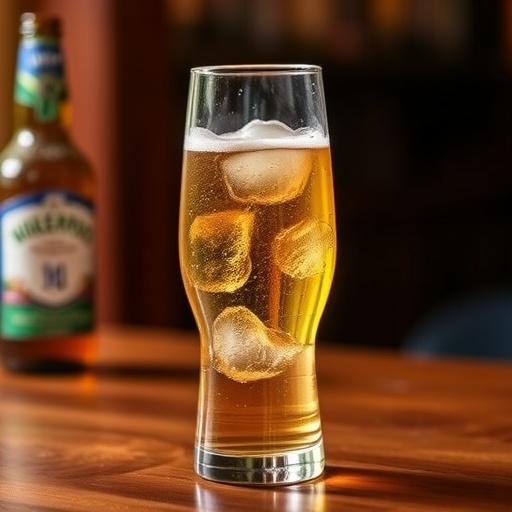A groundbreaking study published in The Lancet Public Health presents compelling evidence linking exposure to digital alcohol marketing on social media platforms with increased alcohol consumption and binge drinking among adolescents and young adults. This extensive meta-analysis synthesizes data from over 31 individual studies and encompasses a sample exceeding 62,000 individuals, spanning diverse demographics and global regions. The findings challenge conventional narratives around social media use by highlighting not the duration of engagement but the specific content young users encounter as a crucial determinant of drinking behavior.
Jon-Patrick Allem, associate professor at Rutgers School of Public Health and Rutgers Robert Wood Johnson Medical School, emphasizes the paradigm shift in understanding social media’s influence. According to Allem, the discourse has often fixated on the quantity of screen time without adequately addressing the qualitative impact of the content itself. This study reveals that algorithmically amplified alcohol-related content functions as a potent behavioral cue, normalizing drinking and increasing both experimentation and established usage among youths. The implication is that the online environment actively shapes alcohol-related norms and intentions rather than serving as a mere backdrop to youth culture.
The research integrates results using multilevel random effects models, accounting for heterogeneity across populations and study designs. This methodological rigor strengthens the inference that exposure to digital alcohol marketing is associated with significantly elevated odds of alcohol use within 30 days, binge drinking episodes, and susceptibility among never-users. Remarkably, adolescents exhibited the strongest correlations, indicating heightened vulnerability during critical developmental stages when identity formation and peer influence are especially salient.
Exposure to digital alcohol marketing encompasses a broad spectrum of content intricately embedded within modern social media feeds. Unlike traditional advertisements, this digital marketing strategy blends paid advertisements, influencer endorsements, branded content, and viral user-generated videos that collectively maintain a continuous presence in users’ digital ecosystems. This amalgamation ensures that even passive consumption of social media inevitably involves repeated encounters with alcohol-positive messaging, thereby subtly reinforcing drinking as an appealing or normative behavior.
Scott Donaldson, the lead author and assistant professor at Rutgers Robert Wood Johnson Medical School, notes that individuals exposed to such marketing were nearly twice as likely to report alcohol consumption or binge drinking within the previous month. This figure translates to a substantial public health concern, given the documented risks associated with early and heavy alcohol use, including addiction, impaired cognitive development, and increased likelihood of engaging in risky behaviors.
The study underscores the role of algorithmic amplification—the process by which social media platforms’ algorithms repeatedly present similar content to users based on their past interactions—thus creating feedback loops that intensify exposure to alcohol-related messaging. Such mechanisms exacerbate the normalization of alcohol use, potentially transforming occasional curiosity into established drinking behaviors, especially in impressionable adolescents and young adults.
While the majority of the studies included in this meta-analysis were cross-sectional, limiting direct causality inference, the authors highlight ongoing experiments designed to address temporal sequences and causal pathways. For instance, an innovative pilot study conducted by Allem’s team involving nearly 2,000 young adults demonstrated that brief exposures to influencer videos featuring alcohol increased expressed interest in drinking by factors ranging from 1.5 to 2.5 compared to matched non-alcoholic content. These experimental data provide compelling evidence that subtle digital cues shape drinking intentions beyond pre-existing behavioral tendencies.
This research signals urgent needs for regulatory and platform-level interventions. Despite technological capabilities to implement age gating and customize feeds to reduce youth exposure, enforcement remains fragmented and often circumvented. The study advocates for more stringent oversight and development of youth-specific safeguards to curb the normalization of alcohol use on social media. Industry self-regulation, while present, lacks consistency and efficacy, leaving vulnerable cohorts exposed.
Furthermore, the findings prompt a reevaluation of public health communication strategies. Traditional prevention campaigns emphasizing abstinence or moderation may be insufficient in contexts where digital marketing omnipresence subtly erodes resistance and fosters positive associations with alcohol consumption. Novel approaches that disrupt algorithmic reinforcement or elevate digital literacy around marketing tactics could serve as critical components in contemporary intervention frameworks.
The meta-analysis also touches on a broader sociotechnical challenge—the tension between digital innovation and public welfare. Social media platforms prioritize engagement metrics, often favoring content that resonates emotionally or socially, even when such content promotes harmful behaviors. Reconciling commercial interests with health imperatives requires both policy change and corporate accountability to prevent digital environments from becoming inadvertent vectors of substance abuse normalization.
Ultimately, the study offers a clarion call to researchers, policymakers, healthcare professionals, and technology leaders to recognize and address the nuanced ways digital marketing shapes youth behavior in the 21st century. As social media continues to evolve as a dominant cultural force, understanding its role in substance use initiation and maintenance is paramount to safeguarding the wellbeing of future generations.
Subject of Research: People
Article Title: Association between exposure to digital alcohol marketing and alcohol use: a systematic review and meta-analysis
News Publication Date: 27-Oct-2025
Web References: http://dx.doi.org/10.1016/S2468-2667(25)00219-1
Keywords: Social media, Alcohol abuse




